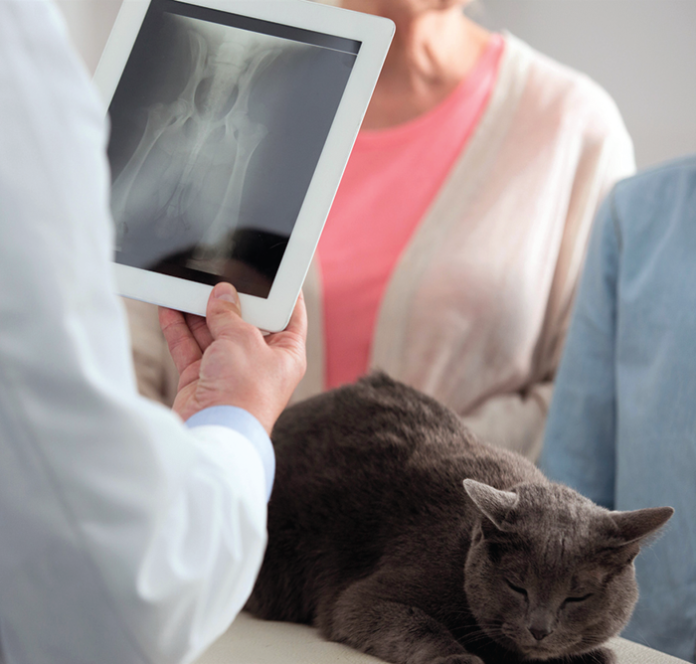The ability of veterinarians to diagnose your cat has increased at an amazing rate over the past few decades. Technical advances in imaging and other diagnostic tests allow your veterinarian to obtain the vital information needed to treat your cat and help him live a long, healthy life. Obviously, this is a good thing. The downside, of course, is the cost of all of this technology.
Whether or not your cat needs an extensive diagnostic workup depends at least in part on the problem. If your cat is itchy in his anal region and you see whitish segments there, in most cases, your veterinarian will suspect tapeworms and dispense an appropriate dewormer. That’s simple. On the other hand, if your cat is itching extensively and there is no evidence of fleas, recommended diagnostic tests may range from skin scrapes to intradermal injections as part of allergy testing.
When your veterinarian looks at a cat, he or she considers the history, presenting symptoms, and what is detected upon initial physical examination to determine the best next diagnostic steps. If the 6-month-old stray kitten you adopted two weeks ago has diarrhea, a fecal analysis will likely be the first diagnostic test recommended. On the other hand, if your 14-year-old house cat has diarrhea, she may need radiographs, an ultrasound, or even an intestinal biopsy for your veterinarian to know what is wrong.
Feline Health Center’s Camuti Consultation Service
A vital aspect of the Cornell Feline Health Center’s operations is the Dr. Louis J. Camuti Memorial Feline Consultation Service, which provides callers with current information on feline health care. This service is, to our knowledge, the only one of its kind, and has helped many cat owners, breeders, and veterinarians. This fee-based phone service puts you in contact with one of their outstanding veterinary consultants, who will discuss your cat’s condition and/or care with you. Go to https://tinyurl.com/CornellCatConsult to learn more.
When Things Get Tough
Choosing appropriate diagnostic tests can be challenging when there is no definitive test for a specific disease or when the only options are expensive. For example, there is no specific test for epilepsy. Veterinarians may perform various diagnostic tests to rule out possible causes of seizures in your cat and, if all of them come back negative, a presumptive diagnosis of idiopathic (of undetermined origin) epilepsy is made. However, while an MRI is a legitimate diagnostic test to rule out some causes of seizures, it can be expensive. In some cases, owners and veterinarians may decide to forego additional tests initially and treat presumptively for idiopathic epilepsy to see if such therapy is effective, thereby supporting the presumptive diagnosis.
You may discuss setting other types of limits for diagnostics with your veterinarian. With an easily stressed cat, an owner may decide, for example, to limit diagnostics to noninvasive procedures. In some cases, a hospital stay overnight for a biopsy might be challenging for an elderly, frail, and nervous cat, and this concern should be discussed with the veterinary team.
The information you gain along the way through recommended tests can be a factor in your decision, as well. If you approve an MRI for your seizing cat, for example, and it shows brain cancer, what should you do from there? If your cat is 14 years old and you cannot afford brain surgery, you may choose to pass on pursuing this procedure, which is understandable and acceptable.
In some cases, a diagnostic test may clarify what’s happening but doesn’t give you a diagnosis. This is the case, for example, in tests that help to stage or grade cancers. You may know your cat has cancer, but additional testing may guide treatment options and give you a more accurate prognosis for your cat, which may or may not be of value to you.
Decisions
Expense is a legitimate factor. Pet health insurance relieves some of the pressure on your finances, but not all plans cover all diagnostics and/or diseases. For example, a plan might cover one blood chemistry panel per year, but not the repeated ones necessary for your cat with kidney failure, leaving you relying on the veterinarian’s guidance.
With any health problem, your veterinarian usually will provide options as to diagnosis and treatment. If finances are critical, therapy may become more important than a definitive diagnosis. Proceed based on your veterinarian’s experience and the likelihood of your cat having a certain problem.
A frank discussion with your veterinarian regarding what tests are likely to provide the best diagnostic return for their expense and the best options for your cat based on his overall health and age is important.
You Should Know
Veterinary costs continue to rise as technological advances are made, making pet health insurance worth consideration.
Choose a policy that considers actual cost of the veterinary care. A “fee schedule” policy is a pre-determined payment that could come up short.
Know the different coverages: Drug coverage (medicines), continual coverage (chronic conditions like cancer or diabetes for the cat’s life), accident coverage (accidents only), wellness coverage (pricey, but covers routine care).
Read more in our November 2019 issue “Smart Pet-Insurance Decisions” available at catwatchnewsletter.com.




